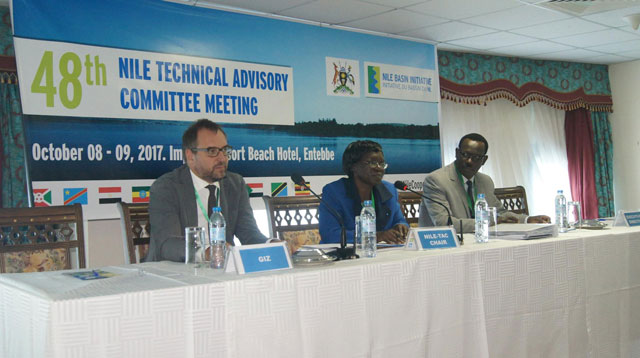
Kampala, Uganda | THE INDEPENDENT | Ethiopia has assumed leadership of the Nile Basin Initiative (NBI), taking over from Uganda. Ethiopia will chair both the Nile Council of Ministers and the Nile Technical Advisory Committee of the NBI for the next one year.
The new chairman of the Nile Council of Ministers is Dr. Eng. Sileshi Bekele, Minister of Water, Irrigation and Electricity of Ethiopia, who is replacing Uganda’s Sam Cheptoris.
The changes in leadership were confirmed at the end of the 25th Nile Council of Ministers of Water Affairs (Nile-COM) meeting held in Entebbe, Uganda on Thursday October 12. Kebede Gerba, State Minister, for Water, Irrigation and Electricity of Ethiopia represented Bekele.
The Nile-COM is the highest decision-making organ on all political and development matters relating to the Nile Basin Initiative. The meeting was attended by Ministers in charge of Water Affairs from Burundi, Sudan and Uganda. Ethiopia, Kenya, Rwanda and Tanzania sent representatives.
The changes in leadership are in keeping with the NBI tradition of annually rotating the position among member states. The next such gathering, the 26th Annual Nile Council of Ministers Meeting, is scheduled to take place in Ethiopia in 2018.
Also on the NBI calendar, according to a statement issued after the Entebbe meeting, is the 5th Biennial Nile Basin Development Forum that will be hosted by Rwanda October 23-25, 2017. Rwanda will also host the Nile Media Awards ceremony on October 23, 2017 as well as a Strategic Dialogue Forum between NBI and development partners on October 26, 2017.
Egypt on agenda
Key among the deliberations on Nile river cooperation in the one day meeting, that was preceded by a gathering of the Nile Basin Technical Advisory Committee (Nile-TAC), was the issue of Egypt. “In this regard, very fruitful discussions were held regarding Egypt’s resumption of its participation in NBI activities,” a statement from NBI stated.
NBI 10-year Strategy
The Nile-COM approved the NBI strategy. Key in the strategy is increasing hydropower, development and power trade; improving food security; protecting and restoring ecosystems across the basin. The other goals are improving basin resilience to climate change impacts; strengthening transboundary water governance in the Nile Basin as well as enhancing availability and sustainable management of transboundary water resources of the Nile Basin.
The NBI work plan and budget for 2017/18, was approved along with a 5-year programme and new staff structure.
Nile cooperation
On Nile cooperation, the NBI statement said “The River Nile is one of the world’s great assets. As such, cooperation is not a choice, but a necessity, if we are to achieve its sustainable management and development. This is important for Member States to jointly address the shared challenges such as climate change and environmental degradation. In this regard, very fruitful discussions were held regarding Egypt’s resumption of its participation in NBI activities.”
On financial sustainability of NBI, the statement said countries with outstanding arrears committed themselves to clearing them within the shortest time possible. It was also agreed that country contributions will be made in a timely manner to support the operations of NBI.
President Sisi explains #Egypt’s strong stand on Nile Basin https://t.co/nhf4bfEhge #NBSummitUG #Water pic.twitter.com/Fsw1iVgF0a
— The Independent (@UGIndependent) June 23, 2017
 The Independent Uganda: You get the Truth we Pay the Price
The Independent Uganda: You get the Truth we Pay the Price



